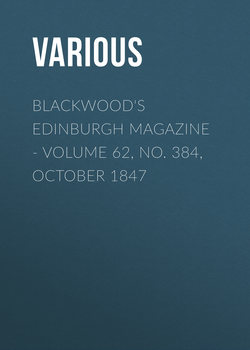Читать книгу Blackwood's Edinburgh Magazine - Volume 62, No. 384, October 1847 - Various - Страница 7
THE VISION OF CAGLIOSTRO MIRABEAU
ОглавлениеAfter a scarcely perceptible pause, the Voice resumed: "The miseries of those who have abused or lost the powers of seeing, of tasting, or of feeling, have been revealed to thee, O sceptic! Thine eyes have penetrated into the dim retrospections of the past. Look onwards, Balsamo, and thou shalt discern the things that are germinating in the womb of the future."
Cagliostro had scarcely heard this assurance when the curtain hitherto impenetrable to mortal, was raised—the dread shadows of the future were dispelled. He found himself in the upper apartment of one of the most distinguished mansions in Paris. The chamber, which was lofty and spacious, was enriched with the most costly furniture, and the most gorgeous decorations. Pilasters, incrusted with marble, and enamelled with lapis-lazuli, broke the monotony of the walls and supported the ceiling with their capitals. Between these pilasters were pedestals surmounted with statuary and busts; and these, again, were reflected in the mirrors hung about the room in profusion. An almost oriental luxury characterised the Turkish carpets, as soft as the greensward, and the draperies of velvet which concealed the windows, and fell in graceful folds about a bed at the opposite end of the apartment. An antique candelabrum stood upon the mantelpiece and shed a rosy and voluptuous light over this domestic pomp, while some odorous gums crackled in a chafing-dish upon the hearth and loaded the air with their fragrance.
Familiar as the Rosicrucian was with splendour, his glance roved over these appurtenances with delight, for he had never before seen the evidences of wealth so enhanced by the evidences of refinement. He thought that the possession of such a dwelling would be something towards the realisation of happiness. In the very conception of that ignoble thought, however, he received a solemn and effectual admonition. Before him, in the silent chamber, on either side of it groups of attendants and men robed in the costumes of the court and the barracks, was a deathbed. It was the deathbed of an extraordinary being, the owner of all this grandeur. It was the deathbed of Honoré-Gabriel de Mirabeau.
The patrician demagogue reposed upon the pillows in the final stage of dissolution, and his broad forehead was already damp with the sweat of his last agony. Cagliostro surveyed the dying tribune with emotion, for in the very hideousness of his countenance there was a subtle and indefinable fascination. The gigantic stature which had so often awed the tumults of the National Assembly was prostrate. The voice, whose brazen tones had sounded like a trumpet over the land, was hushed—that voice which had exclaimed with such sublime significance to the Marseillais,—"When the last of the Gracchi expired, he flung dust towards heaven, and from this dust sprang Marius!"—that voice which had conquered the aversion of Mademoiselle de Marignan with its seductive melody—that voice which had been at once the oracle of the king and the law of the rabble. Mirabeau lay before the Rosicrucian, with his natural ugliness rendered yet more repulsive by the tokens of a terrible malady. The touch of death imparted additional horror to the massive deformity of his skull, to the coarseness of his pockmarked features, to his sunken eyeballs, to his cheeks scared by disease, to his hair bristling and dishevelled like that of a gorgon. Still, through all these unsightly and almost loathsome peculiarities, there was perceptible a sort of masculine susceptibility. It was that susceptibility which gave zest to his debaucheries, and occasionally subdued into pathos the storms of his dazzling and sonorous eloquence.
